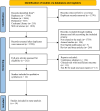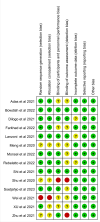Efficacy and safety of mesenchymal stem cells therapy in COVID-19 patients: a systematic review and meta-analysis of randomized controlled trials
- PMID: 38851730
- PMCID: PMC11162060
- DOI: 10.1186/s12967-024-05358-6
Efficacy and safety of mesenchymal stem cells therapy in COVID-19 patients: a systematic review and meta-analysis of randomized controlled trials
Abstract
Background: The coronavirus disease 2019 (COVID-19) has become a serious public health issue. In COVID-19 patients, the elevated levels of inflammatory cytokines lead to the manifestation of COVID-19 symptoms, such as lung tissue edema, lung diffusion dysfunction, acute respiratory distress syndrome (ARDS), secondary infection, and ultimately mortality. Mesenchymal stem cells (MSCs) exhibit anti-inflammatory and immunomodulatory properties, thus providing a potential treatment option for COVID-19. The number of clinical trials of MSCs for COVID-19 has been rising. However, the treatment protocols and therapeutic effects of MSCs for COVID-19 patients are inconsistent. This meta-analysis was performed to systematically determine the safety and efficacy of MSC infusion in COVID-19 patients.
Methods: We conducted a comprehensive literature search from PubMed/Medline, Web of Science, EMBASE, and Cochrane Library up to 22 November 2023 to screen for eligible randomized controlled trials. Inclusion and exclusion criteria for searched literature were formulated according to the PICOS principle, followed by the use of literature quality assessment tools to assess the risk of bias. Finally, outcome measurements including therapeutic efficacy, clinical symptoms, and adverse events of each study were extracted for statistical analysis.
Results: A total of 14 randomized controlled trials were collected. The results of enrolled studies demonstrated that patients with COVID-19 pneumonia who received MSC inoculation showed a decreased mortality compared with counterparts who received conventional treatment (RR: 0.76; 95% CI [0.60, 0.96]; p = 0.02). Reciprocally, MSC inoculation improved the clinical symptoms in patients (RR: 1.28; 95% CI [1.06, 1.55]; p = 0.009). In terms of immune biomarkers, MSC treatment inhibited inflammation responses in COVID-19 patients, as was indicated by the decreased levels of CRP and IL-6. Importantly, our results showed that no significant differences in the incidence of adverse reactions or serious adverse events were monitored in patients after MSC inoculation.
Conclusion: This meta-analysis demonstrated that MSC inoculation is effective and safe in the treatment of patients with COVID-19 pneumonia. Without increasing the incidence of adverse events or serious adverse events, MSC treatment decreased patient mortality and inflammatory levels and improved the clinical symptoms in COVID-19 patients. However, large-cohort randomized controlled trials with expanded numbers of patients are required to further confirm our results.
Keywords: COVID-19; Efficacy; Mesenchymal stem cells; Meta-analysis; Safety.
© 2024. The Author(s).
Conflict of interest statement
The authors declare that they have no competing interests.
Figures













References
-
- Dominici M, Le Blanc K, Mueller I, Slaper-Cortenbach I, Marini F, Krause D, et al. Minimal criteria for defining multipotent mesenchymal stromal cells. The international society for cellular therapy position statement. Cytotherapy. 2006;8(4):315–317. - PubMed
-
- Luo S, Deng Z, Zhang X, Pan Z, Xu H. Clinical characteristics and outcomes of 2019 novel coronavirus disease patients presenting with initial gastrointestinal symptoms in Wuhan, China: a retrospective cohort study. J Gastroenterol Hepatol. 2021;36(3):694–699. - PubMed
Publication types
MeSH terms
Grants and funding
LinkOut - more resources
Full Text Sources
Medical
Research Materials
Miscellaneous

